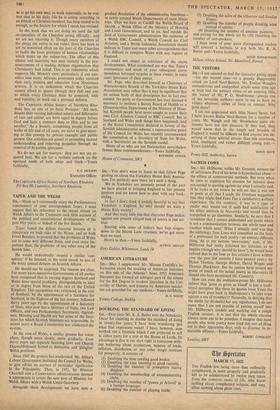TAPER AND THE WELSH Sm,—Much as I customarily enjoy the
Parliamentary commentary of your correspondent Taper, I must suggest that his references to the recent debate on Welsh Affairs in the Commons took little account of the political and constitutional developments of the past fifty years, or indeed of the last decade.
Taper found the debate tiresome because of 'a conspiracy on both sides of the House, and on both Front Benches, to pretend that the problems of Wales arc in some way different from, and even more im- portant than, the problems of any other area of the British Isles. . .
He would undoubtedly suspect a similar 'con- spiracy' if he listened, in the same mood, to one of the many annual debates on Scottish Affairs.
He should not be surprised. The reasons are clear. For many years successive Governments of all parties have recognised that in varying degrees Scotland and Wales have special problems, distinguishable in kind or in degree from those of the rest of the United Kingdom. This recognition was evidenced, in the case of Scotland, by the appointment of a Secretary for Scotland, in the Eighties of the last century; followed thirty years ago by the appointment of a Secretary of State, who now has a Minister of State, two Law Officers, and two Parliamentary Secretaries. Agricul- ture, Housing and Health are but some of the func- tions for which Scottish Ministers are responsible. In recent years a Royal Commission has vindicated the system.
In the case of Wales, a similar process has taken place, though more slowly, more gradually. Even thirty years ago separate licensing laws and Church Disestablishment hinted at distinctive and 'diffetrent' Welsh problems.
Since 1945 the process has accelerated. Mr. Attlee's Labour Government instituted the Council for Wales, to give advice on matters of particular significance In the Principality. Then, in 1951, Sir Winston Churchill and a Conservative administration deemed It appropriate to create the new post of Minister for Welsh Affairs with a Welsh Under-Secretary.
Alongside these developments we have seen a gradual devolution of the administrative functions— in newly created Welsh Departments of most Minis- tries. Thus we have at Cardiff the Welsh Board of Health, a Welsh Office of the Ministry of Housing and Local Government, and so on. And outside the field of Government administration the existence of a Welsh BBC Council, a Welsh Council for Civil Aviation, and a Welsh Industrial Association should indicate to Taper and many other correspondents that it is difficult to compare Wales with any regions of England.
I could not object to criticisms of the above developments. What astonished me was that Taper's commentary and much of your subsequent corre- spondence betrayed surprise at these events; in some cases ignorance of their extent.
Mr. Page, who described himself as Chairman of Worcestershire Branth of the Yorkshire Home Rule Association, may reflect that it may be significant that no serious body of that description has in fact ever existed. No party or Government has ever deemed it necessary to institute a Surrey Board of Health or a Gloucestershire Department of the Ministry of Hous- ing. Kentish people have never sought to create their own Civil Aviation Council or BBC Council. But in Scotland and Wales such things have happened. And as the Royal Commission declared in favour of the Scottish administrative scheme, a representative panel of the Council for Wales has recently recommended the constitution of a Secretary of State for Wales, with a Secretariat on the Scottish model.
Many of us who are not Nationalists nevertheless favour these recommendations.—Yours faithfully,


































 Previous page
Previous page